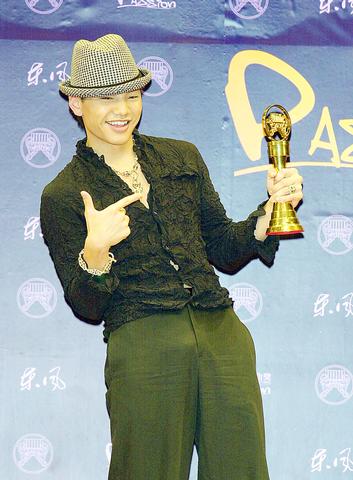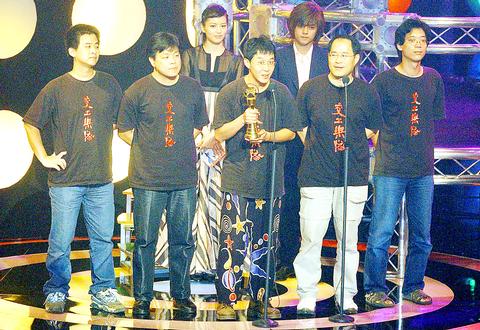Call it a one-man show. Only these words capture how completely Jay Chou (
There was little surprise in Jay winning four awards, including the coveted Best Album. After all, either he or his album were nominated in all seven categories that could possibly apply to him, and in one category his album was nominated three times, giving him a total of 10 shots at a prize.

PHOTO: TAIPEI TIMES
In addition to Best Album, Chou also picked up Best Songwriter and Best Producer, and Vincent Fang(

PHOTO: TAIPEI TIMES
The annual Golden Melody Awards, held in Kaohsiung for the second year running, is the biggest event of its kind to recognize the year's highest achievers in the Chinese-language music industry. The event is typically seen as a chance for the industry's divas to show up in outrageous costumes and dazzle the teenyboppers that show up to scream at them. While female glam and glitz was certainly not in short supply, the 21-year-old former music student Chou stole much of the limelight from the female stars.
It is generally accepted that female singers outsell their male counterparts by two-to-one in the Mando-pop arena. But the last year has been an unusual one in a number of ways, and these were apparent at the show. This year's award ceremony was an obvious attempt to put a festive face on a deeply troubled industry.

PHOTO: TAIPEI TIMES
Sales of Mando-pop releases have plummeted in the last year, with some blaming the economy but others pointing to a host of internal problems such as high marketing costs, label over-expansion and a perceived lack of creative releases. That didn't stop thousands of dedicated fans from waiting outside the Kaohsiung Chiang Kai-shek Cultural Center in the blazing sun through the afternoon to see the arrival of the stars. People started to line up outside the venue the previous night to get an up-close view of the stars. It was estimated that there were around 3,000 people on the scene.
Ironically, one of the most anticipated arrivals were the four members of the group F4, who were not nominated in the awards at all. "I don't care about the rest, I just want to see F4, and maybe A-mei too," said Li Huei-tse, one of the predominately female crowd outside the venue.
The arrival formalities established one of the themes that ran through the ceremony, namely that of Taiwan's rampant CD piracy, that some artists see as a major cause of the music industry's poor performance. Taotse (
Struggling for a piece of the limelight were the other male artists like William So (蘇永康), Sky Wu (伍思凱) and Lee Hom Wang (王力宏). But these artists were completely shut out by their rival Chou. Harlem Yu (庾澄慶), who picked up Best Male Singer, was something of a dark horse, especially as he was in a crowded category and facing the evening's megastar Chou.
Backstage, Yu was all choked up and wanted nothing more than to tell the good news to his wife by phone.
Chou, who seemed unmoved my much of the excitement that surrounded him throughout the evening, said that if he had not won the Best Producer, he would have stopped producing altogether. This was in response to a question regarding which of his four awards he regarded as the most important. Chou's self-produced Fantasy album, which was released in September last year, is estimated to have sold over 300,000 copies and has received an award from the IFPI, an international music industry organization, for its outstanding sales record.
The awards for the women were much more evenly distributed among the industry's stable of female divas. A-Mei picked up the award for Best Female Singer having been nominated on four previous occasions without getting an award. "On the last four occasions, I always felt that getting a nomination was enough, but winning this time, it was just incredible," she said backstage.
Sun Yanzi (
Judy Chiang (
Two of the few surprise winners were Labor Exchange (
"I owe all of my inspiration to my grandma," Biung said during an emotional acceptance speech. Biung is the first Aboriginal to win in this category. Backstage, Biung was totally overjoyed with his award and participated in lots of banter with the press. He said he did not want to overemphasize the Aboriginal angle but was delighted that "it was important for the music industry that it wasn't a Taiwanese-language artist who won" the award on this occasion.
The Aboriginal theme was nevertheless emphasized at the ceremony with an honorary award for recently deceased Ami tribe singer Difang (
On stage, Hakka folk-rock band Labor Exchange spoke about the influence of Chinese rocker Cui Jian (
The Golden Melodies have been good to Labor Exchange, who gained wide recognition after picking up two awards in traditional music categories in 2000. The move into the Best Band category is a major shift for them and is indicative of their broader appeal. Even so, Lin Sheng-hsiang (
As to the Best New Artist to come on the scene this year, the Golden Melodies gave the nod to Jeffrey Kong (
Best Album
Fantasy (周杰倫范特西), Jay Chou (周杰倫)
Best Pop Instrumental Album
Moonlight Frontier (月光邊境), Lin Hai (林海)
Best Video
Fleeting Time (流年) from Fleeting Time (流年) by Faye Wong (王菲)
Best Songwriter
Jay Chou (周杰倫) for Ai Cai Hsi Yuan Chian (愛在西元前) from Fantasy (周杰倫范特西)
Best Lyricist
Vincent Fang(方文山) for Wei Lian Ku Pao (威廉故堡) from Fantasy (周杰倫范特西)
Best Arrangement
Tung Hsing-min (鍾興民) for Shuang Jie Kun (雙截棍) from Fantasy (周杰倫范特西)
Best Producer
Jay Chou (周杰倫) for Fantasy (周杰倫范特西)
Best Mandarin Male Singer
Harlem Yu (庾澄慶), Tidal Wave (海嘯)
Best Non-Mandarin Male Singer
Biung (王宏恩) for Biung (王宏恩)
Best Madarin Female Singer
A-Mei (張惠妹), Truth (真實)
Best Non-Mandarin Female Singer
Jody Chiang (江蕙), Jody Chiang (江蕙)
Best Band
Labor Exchange (交工樂隊), The Night March of the Chrysanthemums (菊花夜行軍)
Best New Artist
Jeffrey Kong (孔令奇), 01

Cheng Ching-hsiang (鄭青祥) turned a small triangle of concrete jammed between two old shops into a cool little bar called 9dimension. In front of the shop, a steampunk-like structure was welded by himself to serve as a booth where he prepares cocktails. “Yancheng used to be just old people,” he says, “but now young people are coming and creating the New Yancheng.” Around the corner, Yu Hsiu-jao (饒毓琇), opened Tiny Cafe. True to its name, it is the size of a cupboard and serves cold-brewed coffee. “Small shops are so special and have personality,” she says, “people come to Yancheng to find such treasures.” She

Late last month Philippines Foreign Affairs Secretary Theresa Lazaro told the Philippine Senate that the nation has sufficient funds to evacuate the nearly 170,000 Filipino residents in Taiwan, 84 percent of whom are migrant workers, in the event of war. Agencies have been exploring evacuation scenarios since early this year, she said. She also observed that since the Philippines has only limited ships, the government is consulting security agencies for alternatives. Filipinos are a distant third in overall migrant worker population. Indonesia has over 248,000 workers, followed by roughly 240,000 Vietnamese. It should be noted that there are another 170,000

In July of 1995, a group of local DJs began posting an event flyer around Taipei. It was cheaply photocopied and nearly all in English, with a hand-drawn map on the back and, on the front, a big red hand print alongside one prominent line of text, “Finally… THE PARTY.” The map led to a remote floodplain in Taipei County (now New Taipei City) just across the Tamsui River from Taipei. The organizers got permission from no one. They just drove up in a blue Taiwanese pickup truck, set up a generator, two speakers, two turntables and a mixer. They

Hannah Liao (廖宸萱) recalls the harassment she experienced on dating apps, an experience that left her frightened and disgusted. “I’ve tried some voice-based dating apps,” the 30-year-old says. “Right away, some guys would say things like, ‘Wanna talk dirty?’ or ‘Wanna suck my d**k?’” she says. Liao’s story is not unique. Ministry of Health and Welfare statistics show a more than 50 percent rise in sexual assault cases related to online encounters over the past five years. In 2023 alone, women comprised 7,698 of the 9,413 reported victims. Faced with a dating landscape that can feel more predatory than promising, many in